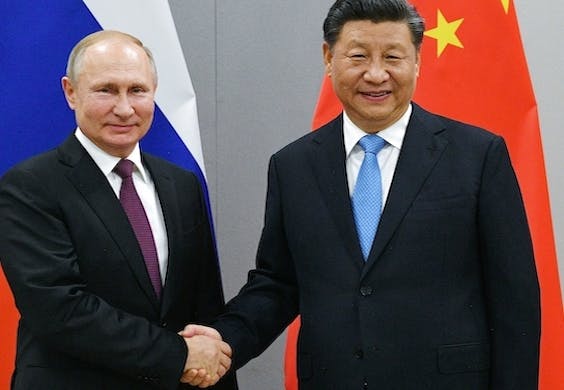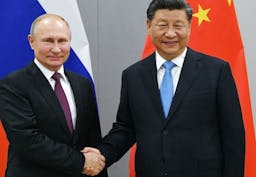Tale of Two Alliances Is Glimpsed in Washington and Beijing
In the new global equation, guess which side is on the march.

Two appearances — one in Beijing over the weekend, and a joint press conference today at Washington — show which side of the global new equation is on the march.
China’s Communist Party chairman, Xi Jinping, met Russia’s president, Vladimir Putin, over the weekend at the opening of the Beijing Winter Olympics. The two leaders of an emerging anti-American front smiled together for the cameras. They also released a 5,364-word joint statement to bolster their alliance.
On the other side of the world, President Biden met today with the new German chancellor, Olaf Scholz. The parley was followed by a White House press conference in which reporters probed disagreements between Berlin and Washington. Messrs. Biden and Scholz sought to gloss over their differences. Their protestations only put into sharp relief the gap between them — their weaknesses — in the face of the Ukraine crisis.
Washington officials similarly tried to find differences between Beijing and Moscow following the weekend’s Chinese-Russian statement. That text failed to mention the word Ukraine, noted National Security Adviser Jake Sullivan, who made the rounds on Sunday’s television shows. That, he maintained, “suggests that China is not so excited about cheerleading Russia on Ukraine.”
Yet the Chinese-Russian statement did include opposition to “further enlargement of NATO” — a central Russian talking point, as well as several other demands included in a list from Moscow list that was recently rebuffed by Washington.
Also, the joint Sino-Russ statement included clear opposition to “any form” of Taiwan independence, an unyielding Beijing position. The statement also stressed opposition to “unilateral sanctions” — a direct jab at America’s favored tool in international affairs.
Russia also supported a United Nations-based Chinese initiative to incorporate into the UN’s global development goals Beijing’s lending program known as the Road and Belt Initiative .
Facing reporters, the American and German leaders didn’t have the luxury of carefully scripting their unity in a statement. Both nevertheless complimented each other’s commitment to their alliance, which critics questioned.
As the former American ambassador in Berlin, Richard Grenell, tweeted yesterday, “Russians are on the offense, Ukraine’s economy has been destabilized with fear, NATO members are scrambling to show relevance and the Germans will only stop their Russian gas pipeline if there’s an actual war? Shameful selfishness.”
The German-Russian pipeline project, Nordstream2, which has been completed but is yet to start streaming Russian gas to Germany and Europe, was front and center in today’s White House press conference.
“If Russia invades — that means tanks are crossing into Ukraine — there will be no more Nordstream2,” Mr. Biden said. He declined to detail the measures to end the project, saying only “I promise you we’ll be able to do it.”
Mr. Scholz on the other hand sidestepped the question, saying only, “We will be united, we will act together.” He hasn’t even mentioned Norstream2, waxing poetically instead about a future with no gas or oil. We need to view the energy crisis through a “long term perspective,” he said. In it, he added, Germany’s heating needs would be satisfied with hydrogen.
Germany’s “reluctance to support any meaningful sanctions against Russia at this point is absurd to me,” Senator Joni Ernst, a Republican of Iowa, told Fox News. “We can help Germany move away from their reliance [on Russia] by looking towards the United States and other partners to support their energy needs.”
Like Mr. Grenell, Ms. Ernst said acting against Russia only after it has invaded Ukraine would be too late. Yet, Washington and Berlin are reluctant to make any significant move to deter Mr. Putin ahead of an invasion, largely due to Germany’s sensitivities.
While the German and American leaders met in Washington, President Macron flew to Moscow, where he conferred for five hours with Mr. Putin. Even as their meeting yielded no public statement — or any discernible result — both Europe and America continue to bank on some elusive “diplomatic” solution to the Ukraine crisis.
In Beijing, Mr. Xi and his Russian guest displayed a strong alliance built on the desire to inherit America’s superiority on world affairs. In Washington, an American president and his German guest showed why their adversaries believe such an achievement is doable.
________
Twitter @bennyavni

